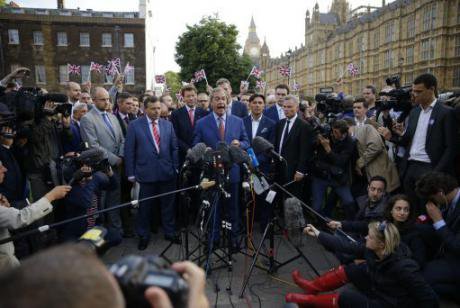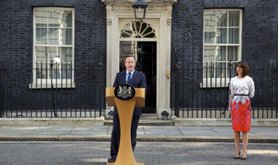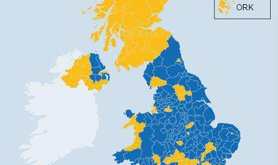
Nigel Farage: victorious. PAimages/Matt Dunham. All rights reserved.The shockwaves from England and Wales’ Brexit vote will reverberate and grow for months and years to come.
In the first few hours since the vote, there have been calls for a second Scottish independence referendum, for a vote on Irish reunification, for joint control of Gibraltar, Cameron’s resignation, the Labour right mounting a pre-planned attack on Corbyn, falling stock markets, falling pound and other currencies and more.
A divided public
Some are labelling this a backlash of the public against the elites. Yet 48% of the UK public voted to remain in the EU – so it’s a divided public. And the Leave campaign was run by Boris Johnson and Michael Gove, as elite as any, with the aid of the mostly eurosceptic British media.
But certainly Cameron takes a huge share of the responsibility for this historic shift in the UK’s role in Europe and the world, and the associated political, economic and constitutional crises that are now developing. Cameron did not need to call the referendum. And the Remain campaign, though promising a fresh, non-elitist approach put forward so many older, white men as spokesmen that it felt just like the 1970s – but without the result of the 1975 EU referendum.
The Remain side thought they won the economic argument – but in fact they struggled even to counter the biggest, simple lie from Leave that the UK sends £350 million a week to Brussels. And on immigration, Remain was so on the defensive that Leave had an easy ride as they stirred up populist and xenophobic demons.
Cameron after all was not the one who was going to point out that Tory cuts – not the EU and immigration – had led to the parlous state of the NHS, education and housing. And much of the Labour vote that went for Leave was on these issues.
Cameron’s Little England
Cameron criticised the Leave side for being ‘Little Englanders’ but the underlying fact, that also underpinned the weakness of his Remain arguments, is that Cameron had already created, as Prime Minister, a Little England approach to the UK’s policies and behaviour towards the EU and the wider world.
Under Cameron, since 2010, the UK had hugely lost influence in the EU – standing back from the eurozone crisis, even though it was part of the wider global economic crisis, letting Germany lead on the Russia-Ukraine crisis, determinedly cutting the UK off from the continuing refugee crisis and more.
And yet that cutting off, Little England strategy was inevitably hard if not impossible to marry with a compelling argument for staying in the EU.
The referendum debate focused on the truth, exaggerations, lies and distortions of the narrow costs and benefits to the UK of being part of the EU. It didn’t focus on the wider, strategic benefits – from security, and political stability to the economy – of working cooperatively and in solidarity with the rest of the EU.
And without making the wider case for the big, strategic benefits of EU membership – with the UK the second largest member state – how could Cameron or any other pro-EU voice explain that the UK played a crucial role in helping Europe to reunite after the Berlin Wall fell in 1989. That EU enlargement was and is good for the EU’s – and UK’s – stability, peace and prosperity. That showing solidarity in allowing free movement from the start to Poles, Czechs and others was both good for our economy and good for our political alliances in the EU.
Instead, the corrosive anti-immigrant message that had developed over many years was not contested at all by the Tories and inadequately by Labour. The very fact that citizens from other EU countries became labelled as ‘migrants’ tells us the argument was lost very early on.
Where Now?
The Remain case was of course made much harder too by the EU handling so badly the crises it faces – from the eurozone crisis to the refugee crisis.
The leaders of the EU’s 27 other member states are moving rapidly to insist that the EU will be strong and carry on at 27. But it can’t just be business as usual. And it mustn’t and shouldn’t be a knee-jerk EU response to set up a reflection group of some sort on democracy and bringing the EU closer to its citizens.
The EU leaders need to look at the Europe they have created in the last few years – the decimation of the Greek economy, the scandalous levels of youth unemployment across southern Europe, the detention in appalling conditions of refugees on the Greek islands – and see how to move rapidly in a better, more moral direction that makes the EU work for not against its citizens and in line with, not undermining, its values and principles.
Now would be the moment to step back from austerity, to develop a continent wide ‘Green new deal’ to promote growth and employment and tackle climate change – and not the window dressing of the EU’s current lip service to such goals. EU leaders will also surely do their best to try to impede any other member state holding a referendum on leaving the EU at such an uncertain and unsettled time as populists from Marine le Pen to Geert Wilders try to seize the moment.
The UK in crisis
Meanwhile the UK will carry on absorbing the extraordinary act of self-harm it has done to its economy, its politics, its role in the world and its integrity as a unified state. The UK is entering a period of profound political, economic and constitutional crisis.
The UK – despite many difficult moments in the EU in the last 40 and more years – played a major part in developing the single market, in the reunification of Europe after the Berlin Wall fell, in joint EU approaches on Iran, in EU climate change policies.
Now the UK will have no role or voice in EU discussions on climate change, on what sort of relationship to develop with Turkey and other unstable and authoritarian neighbours, on the Middle East, on creating a more democratic, fairer and more equal EU, on competitiveness policies, digital policies, and more.
In Scotland, Nicola Sturgeon seized the advantage rapidly with a strong and coherent statement of her determination that Scotland should stay in the EU, with the option of a second independence referendum firmly on the table. How the Scottish public react in the coming weeks will be crucial.
In London, shock may turn to anger, with little clear political sense of how London can protect itself – as a global and European city – from the Little England vote of the June 23.
The EU’s external border will now run between the Republic of Ireland and Northern Ireland leading to complex political debates and reactions starting already.
The economic impacts have begun – the pound falling sharply, stock markets down. Uncertainty is bad for investment and economic decisions: yet no one knows – and we won’t know for a long time – what sort of new relationship the UK will build with the EU.
In the face of that sort of uncertainty, foreign direct investment will surely go to the rest of the EU that would otherwise have come to the UK. In the face of the falling pound, higher uncertainty and falling stock markets, lower growth and investment can be predicted.
It is early days but the impact of the UK’s vote for Brexit are going to reverberate in the UK, in the EU and across Europe, and globally.
The UK has stepped back from Europe, stepped back from the world – and in the process done deep damage to itself, the EU and the wider world.
Read more
Get our weekly email


Comments
We encourage anyone to comment, please consult the oD commenting guidelines if you have any questions.